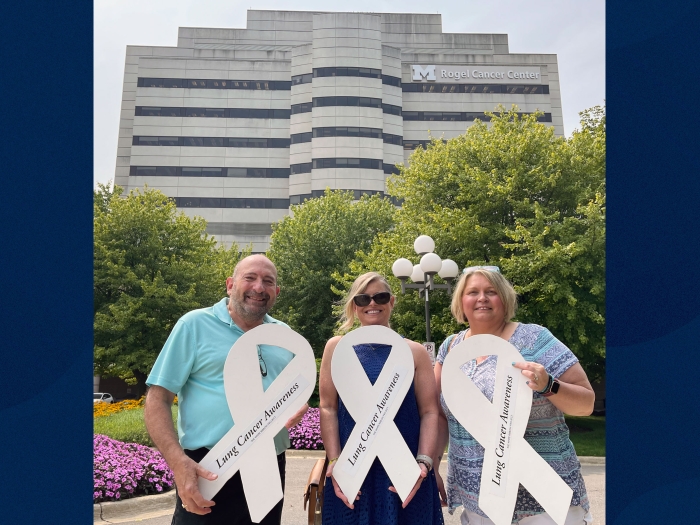Experts answer questions about the connection between cannabis or alcohol use on cardiovascular disease
5:00 AM
Author |
A panel of University of Michigan Health, Michigan Medicine, experts discuss how the use of cannabis and alcohol can be linked to cardiovascular health.
“It depends on your genetics,” said Jonathan Morrow, M.D., Ph.D., an addiction expert and psychiatrist at Michigan Medicine. “A lot of these genetics we don’t understand fully… so that’s going to determine [for cannabis] to a large extent the risk of addiction, a risk for psychosis.”
But how do you know what is, in fact, too much?
Morrow said it boils down to this: “Is it interfering with your life? Are you functioning better or worse with this substance on board? When someone is addicted to cannabis or anything else, they’re going to spending a lot of time using, a lot of their time finding the substance, recovering from the substance. It’s going to interfere with things like work or family, or get into conflicts with people over the use and you’re going to be impaired in your normal functioning. If you see that, if other people see that, and yet you continue to use, then that’s a sign of an addiction at that point.”
Although cannabis is less addicting than some drugs, it can be as severe as other substances.
“I’ve seen peoples’ whole lives fall apart because of cannabis,” Morrow said. “It’s definitely something you can get treatment for and should seek treatment for if it’s becoming a problem, because it really can have a major impact on both the person and everyone else in that person’s life.”
Cannabis can also impact your heart health, says Eric Brandt, M.D., M.H.S., FACC, a cardiologist and lipidologist at the U-M Health Frankel Cardiovascular Center, explaining that there are cannabis receptors in different parts of the body, including your heart and your blood vessels, that the drug can adversely impact.
“They’ve been able to measure that cannabis intake, in whatever form, can activate these receptors, and they actually end up having some potential negative effects, especially physiologically,” Brandt said.
Brandt says research has found cannabis use can cause blood vessel constriction, increase your sympathetic nervous system hormones and are also, in general, pro-inflammatory.
“There have been some studies that have linked these physiological changes after using marijuana to cardiovascular outcomes,” he said. “If you look at broad populations, marijuana use in general is associated with different types of heart problems in states where there’s been legalization compared to states without.”
And marijuana can also impact heart medications, with a potential for dangerous drug interactions, says Monica Colvin, M.D., M.S., FAHA, also a cardiologist at the U-M Health Frankel Cardiovascular Center.
“It’s important to make your doctor aware of any substance you’re taking, whether its an over the counter [medication] or herbal medicine,” Colvin said. “It can increase or decrease effectiveness or levels of medicine that you’re taking. Some compounds that are found in marijuana are using the same pathways to be metabolized as other common heart medications.” This includes blood thinners, anti-cholesterol medications and some blood pressure medicines.
As for alcohol, Morrow and Colvin say, moderation is important.
“There are old guidelines on specific amounts of alcohol. For men, no more than 14 drinks a week, for women no more than seven. No more than one a day for women, no more than two for men,” said Morrow, who notes the term “standard drinks” indicates much smaller amount than you’d expect. “That’s [based on a] 12 ounce beer, 5 ounce glass of wine and 1.5 ounce of liquor.”
But those guidelines were developed a while ago, notes Morrow, before evidence surfaced that alcohol use, at any level, worsens your health. “The less you drink the better. You’d be best off, from just a health perspective, if you didn’t drink at all.”
“I’m frequently asked, how much can I drink?” Colvin said. “There’s probably no amount that’s good for your heart, but there’s amounts that are less bad. In my world, less than 7 drinks a week is better. If you are drinking, do it in moderation.”
How do you know if your alcohol use is a problem? Does binge-drinking have a greater impact on heart health than regular use? Are cigarettes worse than marijuana? What about vaping? Can cannabis use cause AFib or heart rhythm disorders? Those questions, and more, you can listen to these experts answer above in the Facebook Live video.

Explore a variety of health care news & stories by visiting the Health Lab home page for more articles.

Department of Communication at Michigan Medicine
Want top health & research news weekly? Sign up for Health Lab’s newsletters today!





